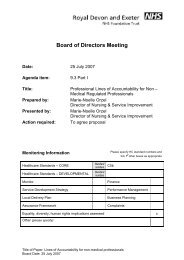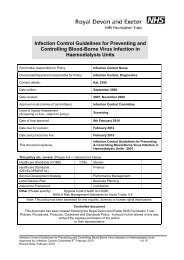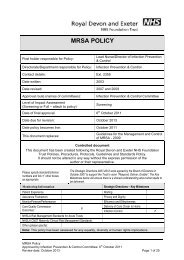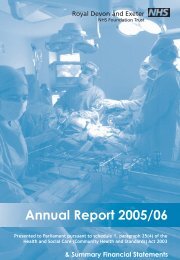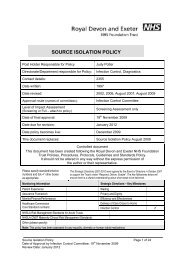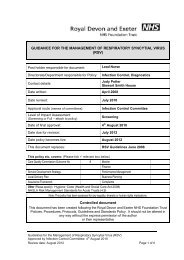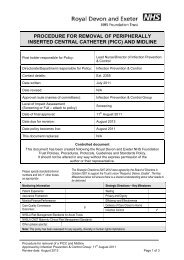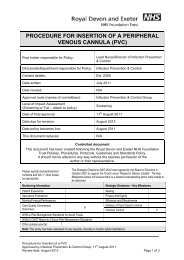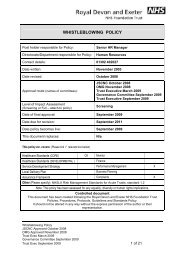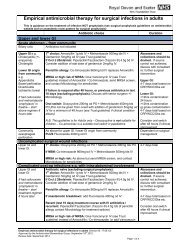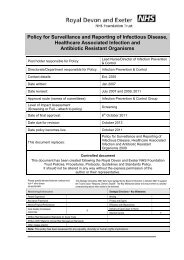Annual Report 2006/07 - Royal Devon & Exeter Hospital
Annual Report 2006/07 - Royal Devon & Exeter Hospital
Annual Report 2006/07 - Royal Devon & Exeter Hospital
Create successful ePaper yourself
Turn your PDF publications into a flip-book with our unique Google optimized e-Paper software.
<strong>Royal</strong> <strong>Devon</strong> & <strong>Exeter</strong> NHS Foundation Trust <strong>Annual</strong> <strong>Report</strong> <strong>2006</strong>/<strong>07</strong><br />
Capital Developments<br />
The hospital landscape has changed a great<br />
deal over the past year – out went the<br />
landmark chimney when steam boilers were<br />
replaced with a new energy centre to supply<br />
steam for the laundry, though far more went<br />
up than came down!<br />
<br />
opening of the Centre for Women’s Health –<br />
the new home for Gynaecology, Maternity and<br />
Neonatal services transferring across from<br />
Heavitree to Wonford. Covering 9,000 square<br />
feet, the Centre includes an atrium entrance with<br />
café and a range of rooms for labour, examination,<br />
assessment, recovery and counselling. There<br />
are en-suite bathroom facilities for patients and<br />
parents with babies in the Neonatal Unit, theatres,<br />
a water-birth pool, a conservatory rest room and<br />
<br />
deliver high-quality healthcare services for women<br />
and children.<br />
Patient power lies at the very heart of<br />
the RD&E’s new Diabetes, Endocrinology and<br />
Vascular Health Centre which serves patients<br />
across <strong>Exeter</strong>, East and Mid <strong>Devon</strong> and is one of<br />
the UK’s leading diabetes facilities. There are<br />
very few centres where the whole gambit of<br />
specialist care, including research and<br />
education, are under one roof.<br />
the lungs can also be examined (bronchoscopy) as<br />
can the urinary bladder (cystoscopy). As well as<br />
diagnosis, various<br />
treatments can be<br />
given via endoscopes,<br />
without<br />
the need for open<br />
surgery.<br />
The project is due<br />
for completion<br />
by October<br />
20<strong>07</strong>, and two<br />
new consultant<br />
gastroenterologists<br />
have already been recruited, as well as 12 nurses,<br />
and several support and administrative staff, to<br />
<br />
The additional capacity will result in all patients<br />
in the urgent category receiving an appointment<br />
for their examination within two weeks and all<br />
other appointments being arranged within six<br />
weeks. It will also improve the detection of<br />
bowel cancer, with diagnosis being achieved at<br />
an earlier stage. The team also plans to have<br />
bowel cancer screening available, subject to<br />
national approval,<br />
within the year.<br />
“We hope that this<br />
all-encompassing centre will support<br />
diabetes care for every patient in our<br />
locality wherever they are, and<br />
whatever problems they have.”<br />
DR KENNETH MACLEOD,<br />
CONSULTANT PHYSICIAN<br />
(DIABETES AND ENDOCRINOLOGY)<br />
The new state-of-the-art Centre for<br />
Women’s Health.<br />
This new centre is better equipped to not only<br />
help medical management of the condition and<br />
its complications but also to empower patients<br />
<br />
The team can now offer an even more responsive<br />
service for patients with acute or complex<br />
challenges, including non-healing foot ulcers,<br />
disorders of limb circulation with risk of<br />
amputation, visual loss and kidney problems that<br />
can lead to kidney failure.<br />
Local diabetes charity DIRECT raised £200,000<br />
towards the overall project cost and has an<br />
<br />
An expansion of the Endoscopy Unit is<br />
currently under way, with plans to increase<br />
the number of procedure rooms from two<br />
to four. Endoscopy is the examination of<br />
<br />
telescope (‘gastroscopy’ being the term used<br />
for investigation of the upper digestive tract<br />
and ‘colonoscopy’ being the investigation of<br />
conditions of the rectum). In a similar manner<br />
The day-to-day work of the Intensive<br />
Treatment and High Dependency Units has<br />
continued, with building work to expand the bed<br />
capacity going on around them. By increasing<br />
the number of beds to 15 this should reduce, if<br />
not eliminate, cancellation of elective cases,<br />
<br />
promptly and admit high-care surgical cases.<br />
8



